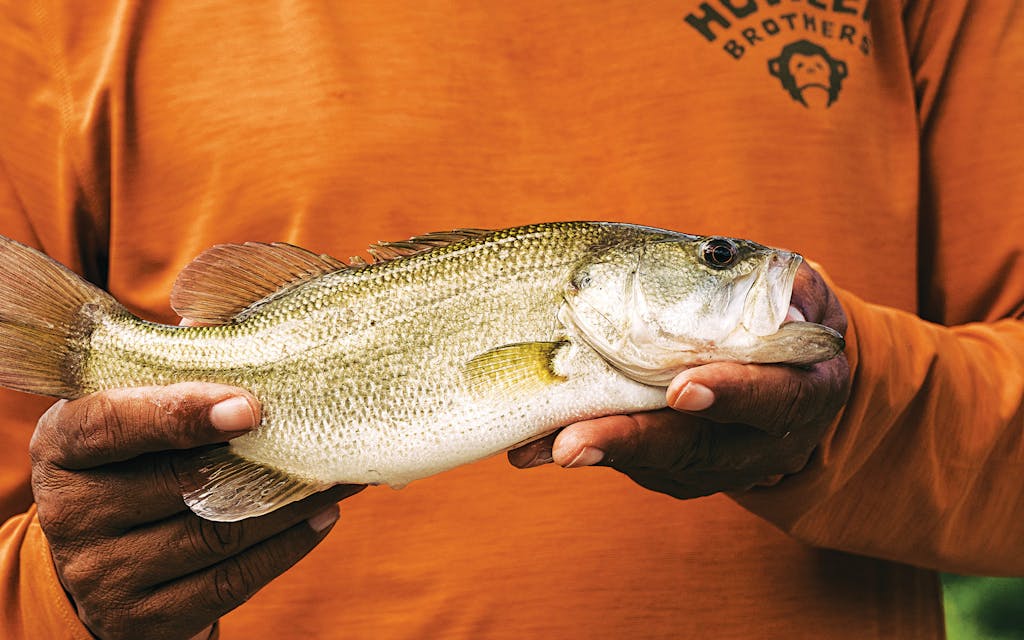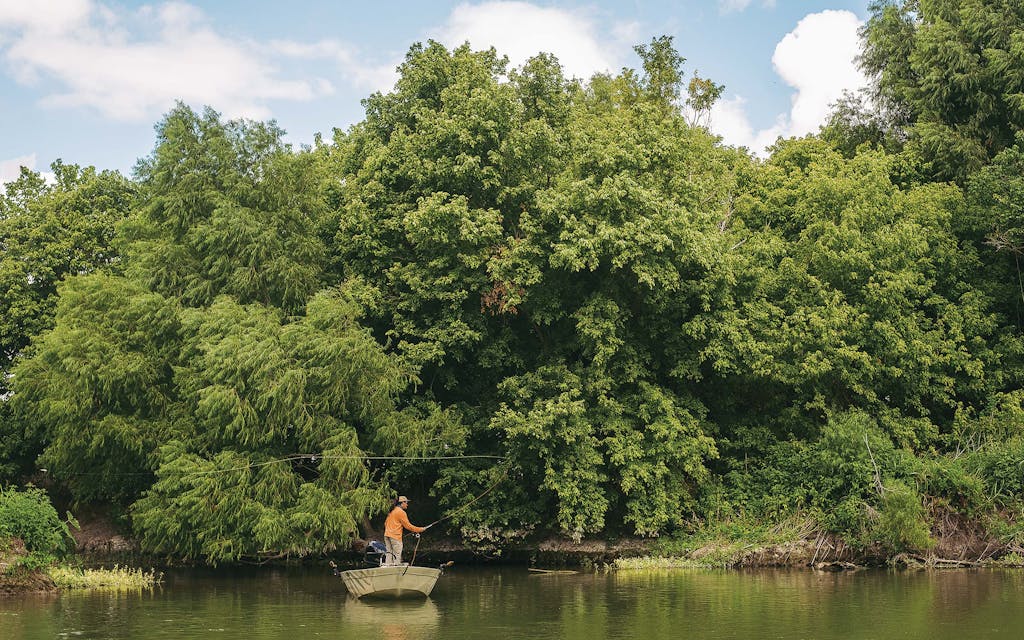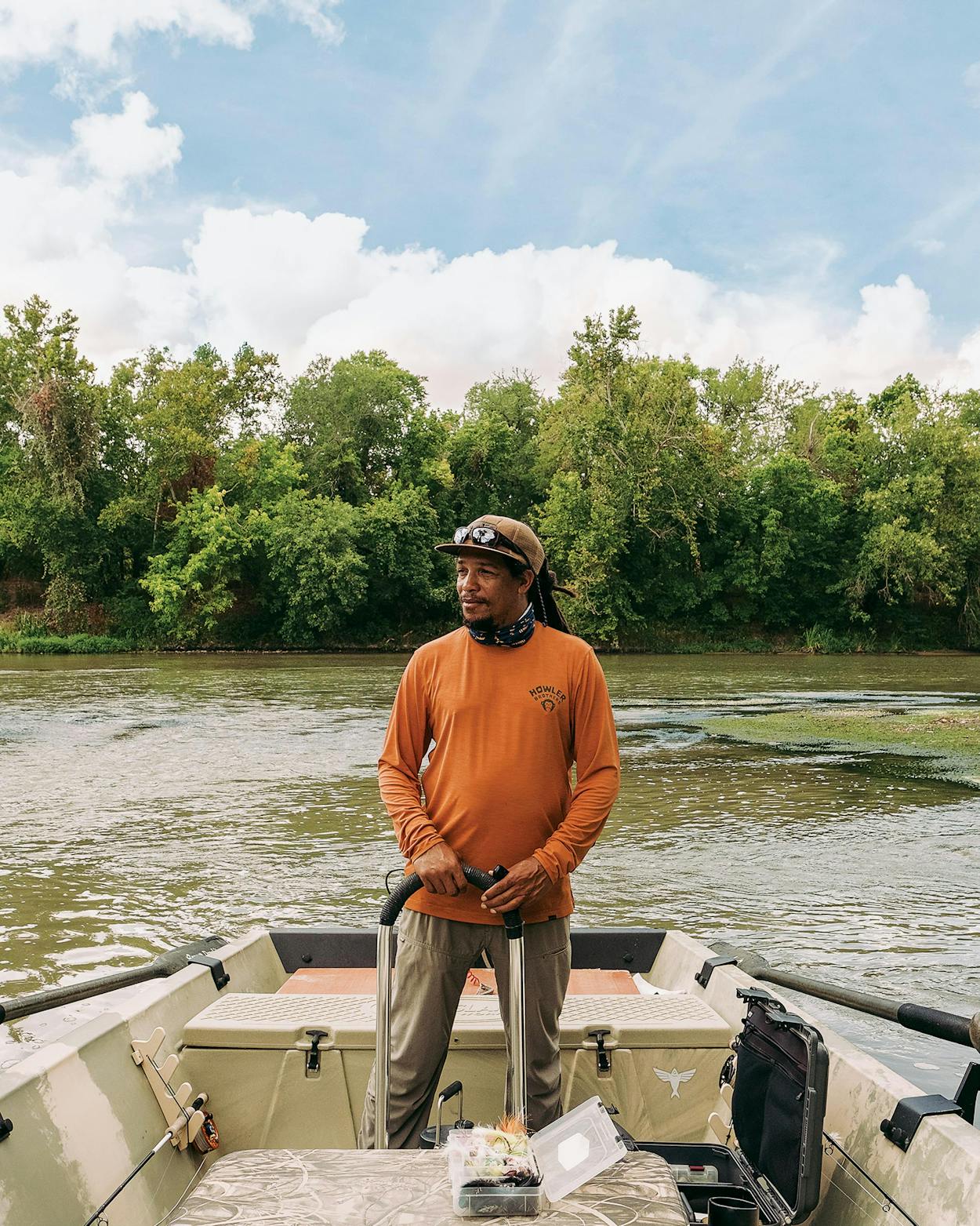“See that foam line under the cypress tree? Cast into it.”
Alvin Dedeaux says this in an offhand manner, with a slight drawl, and the effect makes the directive sound more like a suggestion. This nonchalance is not typical of fishing guides. But the 58-year-old, with his cool demeanor, big laugh, and trademark dreadlocks flowing out from beneath his trucker’s hat, has never been mistaken for a typical guide.
As he quietly rows to keep us in place against the current of the lower Colorado River, a stone’s throw from Austin’s Tesla Gigafactory, I follow his advice and cast into the foam. My fly, a crayfish pattern Dedeaux tied himself, smacks the surface. After a few seconds’ pause to let it sink, I strip the line in before setting into another fish. This one turns out to be a largemouth bass, which comes on the heels of four Guadalupe bass, Texas’s state fish. We’ve been on the water for only an hour, and I’ve already landed a freshwater drum and a large crappie too.
“I don’t know what kind of grand slam that is,” Dedeaux says, “but it must be some kind.”
It’s only after releasing the largemouth that I’m able to convince Dedeaux to hand over the oars so he can pick up a rod. Within three casts he’s landed two largemouth of his own, and so he puts me back in the front of the boat, more out of compassion than any guiding etiquette. “I can come out here anytime,” he says. “You better get yours.”
Dedeaux, despite his laid-back nature (or perhaps because of it), has become the rare fishing guide who has reached celebrity status, at least in the niche world of fly-fishing. For the last twenty years, he’s done as much as anyone to introduce Texans to fly-fishing, a style of angling that’s practically become a religion in the Rocky Mountains but is often an afterthought in the Lone Star State, despite excellent opportunities in the Hill Country. And though he would scoff at terms like “celebrity” or “rock star,” those labels aren’t too far off, especially considering his prominent stint as the charismatic lead singer for the Texas funk band Bad Mutha Goose & the Brothers Grimm. Today Dedeaux is one of Texas’s most prominent—and chill—fly-fishing ambassadors, with more than twenty thousand dedicated followers on Instagram and a roster of big-name sponsors, including Yeti, Orvis, Gerber knives, and Howler Brothers. He churns out a steady stream of social media posts and videos that are unscripted, insightful, and a little meandering, not to mention full of his infectious laughs. This is to say, they are pure Alvin.
His posts are also refreshingly candid, free of the slick, aspirational tone that’s common among social media personalities. In one YouTube clip from the spring, titled “Didn’t Go As Planned Fly Fishing Solo,” Dedeaux created an entire story around footage that anyone else likely would’ve left on the cutting-room floor: getting a line tangled, untangling said line, predicting a fish on a specific cast, and eating one’s words when no fish comes in. “I did catch one fish, one little guy, so I guess it wasn’t a completely pointless trip,” he says in the clip. “But I didn’t get to make the video that I wanted to make. . . . Anyway, you never know if you don’t go.”
These scenes are relatable, often because Dedeaux has an eye for the mundane moments that make up the majority of a fisherman’s life. The videos are not produced—they’re captured. They’re also all Alvin, all the time: Dedeaux films and edits all of his own clips, which puts the focus almost exclusively on him as the narrator. So when he does catch a fish, the payoff feels more, well, earned. It also helps that Dedeaux is a natural in front of the camera.
“I got comfortable being in front of people while I was in the band,” he says, “so being on camera, talking into it while the other people on the boat ignore me, is easy for me. But it still surprises me how many people tune in to my little YouTube channel.”

About those rock-star days: in the late 1980s and early 1990s, fresh out of college at the University of Texas at Austin, Dedeaux became one of the lead singers for Bad Mutha Goose & the Brothers Grimm. The band, put together by musician and artist Tim Kerr, exploded onto the 1980s punk scene in Austin, which had become infamous, thanks to pioneering bands like the Big Boys (also put together by Kerr) and breakout acts like the Dicks and the Butthole Surfers.
In the late eighties and early nineties, Bad Mutha Goose released a series of singles and an album, Tower of Babel. The music was a frenetic mash-up of funk, punk, and rock, and the band recorded with the likes of DJ Muggs from Cypress Hill. During live shows at legendary venues such as Austin’s now-departed Liberty Lunch, the musicians roused crowds into fits of sweaty, reckless dancing. The band played the inaugural South by Southwest Music Festival in 1987 and returned the following year.
“It was a wild time,” Dedeaux says. “We had some big gigs, and it was pretty rare for a punk band that was playing original music to make a living. When we came up, it was either rock bands who made twenty dollars a night or cover bands that played Top Forty hits at frat parties. But we were able to support ourselves playing original music.”
The band was booked all over the U.S. and played numerous tours on the West Coast. During a few shows in San Francisco, Nirvana opened for them. Dedeaux and Kerr, who was inducted into the Texas Music Hall of Fame in 1996, were the driving forces behind the band. Just as they appeared to be on the cusp of stardom, though, Kerr left the group. “He was the main creative force, so I got out shortly after,” Dedeaux recalls.
Dedeaux found himself aimless and looking for something to do. He’d grown up near Houston and had spent most of his youth outside, often with a fishing rod in hand. His father, who owned a small construction company, was raised on “swampland outside New Orleans,” as Dedeaux describes it, and loved to hunt, fish, and cook. “My dad had the skill to make just about any fish or piece of meat taste delicious,” he says.


In grade school, Dedeaux came across a book about fly-fishing, and his parents got him his first fly rod for his twelfth birthday. He kept up with the sport through high school and college and even while fronting for Bad Mutha Goose. One day shortly after he left the band, he was mulling his options with the owner of Austin Angler, a downtown shop that had turned into a hangout for fly-fishing aficionados. Owner Larry Sunderland, who had become a friend of Dedeaux’s, offered him a job. Working at Austin Angler put him in the center of the emerging fly-fishing scene in Central Texas. Soon he picked up kayaking and sport climbing, and he threw his considerable energy into those two passions.
Through the fly shop, he began guiding anglers more often. Eventually, he realized that, with a little bit of work, he could turn it into a real business, one he began focusing on in earnest in the mid-nineties. Texas didn’t have many fly-fishing guides at the time, and most of his peers were doing it as a part-time gig. Dedeaux used his work at Austin Angler (which closed in 2004) to grow a roster of clients. Texans are well known for pursuing fly-fishing in other states and remote corners of the globe, but they often overlook opportunities in their own backyard. Dedeaux introduced a generation of Central Texans to bass on the lower Colorado and Llano Rivers.
He helped clients chase rainbow trout, stocked from a hatchery on the Guadalupe River below Canyon Dam, and redfish, on the Gulf Coast. For several years, he also guided clients seeking trout in Colorado, migrating up north for the summer. Soon his calendar was fully booked months in advance. In 2011 he launched All Water Guides to handle the overflow. It’s designed as a guiding collective—if he’s busy, another one of the company’s guides can take a client out (and vice versa).
“Alvin’s found a name for himself,” says Bonner Armbruster, a guide with All Water. “And it’s good for the rest of us, because we all get extra clients that come through him.”
A few years after becoming a guide, Dedeaux met his wife, Lenée, who was born in the West Texas town of Big Spring. She’d had her own career shift: after years of designing handbags, she, like Dedeaux, had changed direction, earning a master’s degree in aquatic resources from Texas State University. She started managing All Water Guides in 2016.
When I first reached out to Dedeaux about booking a trip, it was Lenée who let me know that “Alvin is booked up until the fall.” These days that’s standard protocol for Dedeaux because he’s in such high demand. Depending on the season, All Water has about a dozen guides on staff. It’s one of the largest guiding collectives of its kind in Texas, and it’s devoted almost exclusively to fly-fishing.
“He’s making sure that we get gear into all of these young guides’ hands, people he’s nurturing and teaching,” says Jake Drees, the fishing marketing manager at Yeti, one of Dedeaux’s primary sponsors. “He’s embraced a different part of the fly-fishing business, one that’s about growing a community.”

Toward the end of our half day on the water, Dedeaux and I switch places again, and he reels in a flathead catfish, completing whatever grand slam this might be. In total, we land maybe twenty fish representing five species. It’s a good day on the water, but also a testament to what an underrated fishery the Lower Colorado is. And while fly-fishing has become more popular in this part of the state, it’s still a niche sport compared to the pursuit of largemouth undertaken by thousands of Texans on lakes and reservoirs.
For Dedeaux, the Lower Colorado is home water, so much so that he and Lenée, through All Water Guides, help organize an annual river-cleanup day with hundreds of volunteers. Earlier this year, Dedeaux also helped organize a sort of fishing contest on the Lower Colorado that ran through August 2022. Dedeaux and fish biologists from Texas Parks and Wildlife went out and tagged thirty Guadalupe bass. If you catch one, take a photo of it and clip off the tag, and you can win free Yeti gear and will be entered into a grand-prize drawing.
On the water, I ask Dedeaux if he can give me some inside tips on where to fish for the tagged bass. He laughs and says it’s no secret. “Those fish move, so they’re all over. I can tell you we already caught one, but we let it go because the contest hadn’t officially started.”
At some point I also ask him the obvious question, about being a Black man in an outdoors industry historically dominated by white men. He answers in typical Dedeaux fashion, with a bit of a shrug. “My parents told me I’d encounter struggles,” he says, “and there were some, but I never really let it bother me.”
Maybe he’s downplaying the hurdles or doesn’t want to pick at the scars. But I also get the sense that when you’re on the water with Dedeaux, he takes the long view—the view that everything else, at least for the moment, is extraneous, including weighty discussions about water quality or racism. Those are conversations for later. Being on the water is about relaxing, and that’s what we’re doing.
When we get to the takeout at Little Webberville Park, we grab sandwiches from our respective vehicles and eat in silence. I notice Dedeaux looking at the sky and checking the weather app on his phone. The wind has shifted, and a cold front is coming.
“Are you thinking about going back out?” I ask.
“I’d like to,” he says. “I’m thinking about making a video, but not sure about the conditions. Got to keep the fans tuning in, though.”
“I bet the fishing will still be good.”
“Could be,” he says. “Could be.”
The video he makes that afternoon is the one that became “Didn’t Go As Planned.” On the water, as in life, things seldom do, but the result is often better than you could have predicted.
This story originally published online on June 13, 2022. A version of it appeared in the October 2022 issue of Texas Monthly with the headline “The Rock Star of Fly-fishing.” Subscribe today.
- More About:
- Hunting & Fishing
- Fishing
- Houston
- Austin







